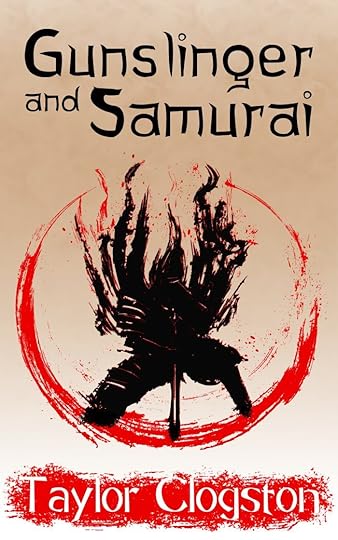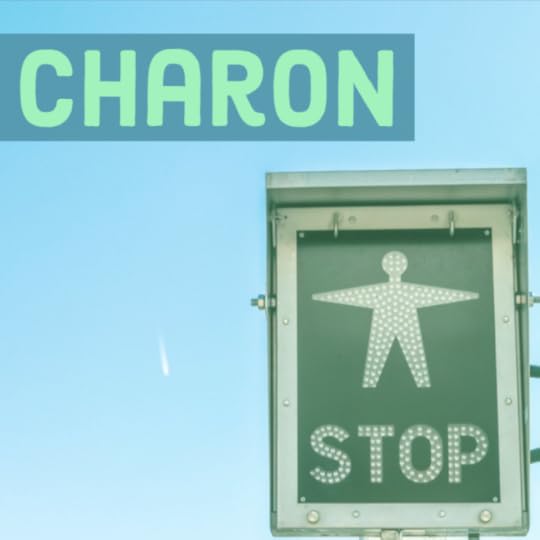Taylor Clogston's Blog: My Author Blog
October 26, 2021
Win Where I Failed: NaNoWriMo Survival Lessons
I’ve published a short article on Medium.com on how to set yourself up for NaNoWriMo success. You can read it here.
September 22, 2021
Conflict and the End of Fiction
The two fundamental elements of story are contrast and shared experience, not conflict. From these two elements proceed all other aspects of story.
My Medium.com essay Conflict and the End of Fiction examines this perspective, drawing from an appendix of sixteen authors’ perspectives on what lies at the heart of story.
June 12, 2021
Encapsulation First Draft
I’ve written the first draft to a scifi novella which you can read for free on Royal Road.
When a foe sets Lieutenant Angers up for destruction by planting an AI-hungry virus on his starfighter, Angers has no choice but to jump blindly into hyperspace in desperate hope of evading the Paraceum on some minor world.
He crashes on Dirt, a small planet colonized many generations ago by human exiles.
Carrick, a young man of no family who lives on Dirt, refuses to give up his mob boss, and for this is sentenced to a lifetime of labor in the Wasteland, the frozen location of humanity’s failed attempt to conquer the stars.
May 15, 2021
Just Keep an Eye On Things
I’ve written a flash fiction about an astronaut locked in a room with only a smart water heater to talk to! You can read the story here.
April 22, 2021
Beta Readers for Gunslinger and Samurai 2!
If you don't own a copy of the first novella, I can send you a free ebook copy for the purpose of the beta program.
I look forward to working with you!
February 28, 2021
Gunslinger and Samurai Available for Preorder
“From the Plane of Steel I call you forth!”
On the day Prince Kurou is to become engaged to the princess of a neighboring city, the bandit lord known as Callicles the Hyena invades the town called White Pepper.
Kurou and the street boy Olivier find themselves unlikely comrades plunged into a world of martial artists, ancient magic, and Lone Wolves who fight as brothers. Follow the journey of the pauper and the prince as they become Gunslinger and Samurai.
 Click to preorder!
Click to preorder!The first novella in my East-meets-West martial arts fantasy series is live for preorder! Giant thank you to Johnathan Morton for cover design advice.
January 21, 2021
Bowling with the President of the United States of America
I’ve published a short story about two gentlemen in a post-Soviet state creating a ballot for their country’s first-ever election.
You can read the story here.
You can listen to a full reading of the story here.
June 15, 2019
Walden Three

They found him wandering the butterfly museum, wearing nothing but a pair of Oxford button-downs and clasping half a crackled Moleskine to his belly. His gait was a mad laugh he made with his toes. I saw him on camera hissing at the cockroaches and sipping quail yolks from their shells.
He died an hour later. They buried him twenty miles away. The mother put his last words on the headstone.
The difference between the word and almost another word is the difference between beef soup and the boiled cabbage.
I asked her about it later. She did it partly out of love, and partly out of spite.
June 11, 2019
Beep

One evening, as she drove along the highway in the rain, an old lady saw a killer robot dragging his death cannon behind him and trudging through mud at the edge of the road.
The old lady’s heart skipped as she considered the dangers of picking up killer robot hitchhikers—suppose he took her checkbook and ran away!—but, being kind, and a hobbyist in the field of killer robotics besides, she stopped the car, rolled down the window, and called out “Where are you going? Would you like a ride?”
With a jerk the killer robot lifted his head and wiped his face plate, peering through the inches of rain between his face and that of the old woman’s. “Roadway Street,” he said. “In Landtown. Are you going that way?”
She was, and unlocked the door so the killer robot could get in the car.
Within the space of a minute, the killer robot had entered the car on the passenger side, had seated and buckled himself in the quickly dampening seat, and had laid his death cannon at his feet, at an angle away from the old lady so that, in case of accidental discharge, it would not blow her head off.
“What do you do for a living?” asked the old lady when a polite amount of time had passed. She had been interested in killer robots all throughout her life, but had never discovered what they actually did.
“My name is Rip Anteir,” said the killer robot. “I work in food service.” He did not say that his whole job comprised taking fast food orders from impatient, beady-eyed people.
“Oh!” said the old lady. “Did you always want to work in food service?”
The killer robot coughed in a way calculated to sound embarrassed. “No, actually. In my free time I conquer the world, and some day I would like to do that full time.”
“Wonderful!” cried the old lady.
“Yes,” he said. “It’s sort of the thing killer robots are meant to do. You could almost say that being a killer robot means conquering the world.”
The old lady sighed. “I’ve always wanted to be a killer robot. Can you give me any advice?”
The killer robot, full of bash, looked toward his metallic feet and smiled. “Oh, there’s not much to it. Once you have a death cannon, you just keep going to countries and destroying their armies.”
“What sorts of countries have you conquered already?” she asked.
“Albania and Chile,” he said. “But I have my sights set on Belgium.”
By this point the car had come a good way into Landtown, and was just then turning onto Roadway Street. The old lady stopped the car in a pool of oil and smiled at the killer robot as he disembarked. “Thank you for the lovely conversation!” she said. Then she left, and they never saw each other again.
The killer robot, feeling satisfied to be admired for his passion, entered his apartment building. It was a dark, mostly empty place, inhabited only by killer robots in the killer robot side of town. There were few of them, and they took up little space. It was space wasted on them, in the eyes of most people. The killer robots themselves had little opinion on the matter, not caring for much but the domination of the earth. In truth, no killer robot spent much time at home.
It was eight o’clock. The killer robot still had two hours before bed. He poured himself a cup of coffee from his death cannon and sat on the floor before his television to drink it. He had no furniture, being a killer robot, and so the floor was where he always sat, whether he was watching the television or eating cornflakes from the soup plate that his great-uncle had left behind in his will.
But two sips and four minutes into his television program, the killer robot remembered the old lady’s encouragement and admiration, and felt guilty to be relaxing in the free time that his schedule allotted him.
So the killer robot rose, and turned off the television, and used a piece of paper and an old, dry marker—his pencils were all broken—to write an agenda for the following day. After a time the killer robot found he could free two hours and sixteen minutes from the following day, which he determined to devote to world domination.
Following this, the killer robot went to bed early. He had no furniture, and so sat on his charging cradle until morning.
The next day, the killer robot rose and went straight to world domination. He took a taxi to Belgium, because the bus would not allow the killer robot to carry along his death cannon, and in no time at all found that he had dominated the country.
Still having a good amount of time before the beginning of the workday, the killer robot conquered the world for a while longer. He threw down the governments of Germany, Wales, and Columbia, and then called his manager to inform him that the killer robot wouldn’t be in that day, for he had things to do.
Within three days, the entire world was under the killer robot’s rule. Humans walked about in shackles, singing the praises of their overlord, dragging sledges of salt from one end of a field to another.
The old lady, reading a newspaper, saw who was behind it, and smiled. “I know him,” she said to a pair of children pulling three tons of salt up a hill. “I gave him a ride home last week!”
But before long the killer robot began to feel despondent. Having achieved his greatest dream, there was nothing left for him to do. Watching all the people of the earth drag salt at his command did little more to raise his spirits than receiving their fast food orders had ever done.
So, on one dreary Thursday, the killer robot climbed to the highest, furthest edge of the world, leaped off, and drowned forever in outer space.
It was not long before people began to lament the killer robot’s passing. “He was a genius!” they cried. “A man well ahead of his time!” Hundreds of would-be overlords, both human and robot, tried to imitate the killer robot’s previous success, but none succeeded. They turned to very practical methods of domination, things that did not inspire awe in onlookers, nor stirred passion in their perpetrators’ chests.
“Such a shame,” said the old woman. “He seemed so nice.” She threw bits of her newspaper to the birds who gathered at the park bench upon which she sat in the midst of a park on a wonderful summer evening. It was a time bespoken for being content with the way one’s life progresses while at the same time pretending one wishes for something more. “I really must become a killer robot myself some day,” said the old lady. “I think I would be superb at it.” The day continued, and recharged itself as on a cradle, and the old lady remained an old lady forever.
June 7, 2019
Charon

Two squirrels sat outside my window. I sipped coffee inside, at my kitchen table, pretending to read a book. It was two thirty in the afternoon on a Friday. I had called out of work sick that morning—though I hadn’t been sick—for no good reason, aside from a foreboding feeling unlike anything I’d ever felt on a Friday morning.
I felt guilty, calling out. It wasn’t a thing I often did. Neither guilt nor sickness were common to me. My wife could have attested to this, had she been there.
But it was only the squirrels and me.
I took another sip. I turned a page, and then turned back, because I hadn’t finished the last one. The squirrels stared on. They were gray things, and skinny. There was no need for the skinniness. We had a bird feeder out front, under the oak, intended for chickadees, and though rodents often got into the seed and spilled it everywhere, annoying the much prettier birds, I had never replaced the feeder with one more rodent-proof. At one time I had larded the pole upon which the feeder sat, but the rodents only leapt down from the tree, and after some time a skunk and licked away all the lard.
The squirrels sat and watched, and I took more coffee and fidgeted. I stood, and went to the fridge, and took out a piece of leftover pizza with broccoli on it. The squirrels did not look at my food.
Back in my seat, I listened for birdsong through the open kitchen window, but there was nothing to hear except the gentle shush of wind through oak leaves. The squirrels swayed with the branches, and if I had been an animal with a good nose, maybe I would have smelled their scent as the breeze carried air through the kitchen and past me.
I took one bite of pizza and then turned to the squirrels. They were perhaps a foot from the window, bending down a branch with their weight. It wasn’t much, between them. Their faces seemed threadbare, like those of plague-bloated, mangy rats, and I was glad of the window screen separating us. As I turned toward them, I made a fake gesture of waving my arms, and glaring, and of making a “Bleh!” noise that would have made my wife roll her eyes had she been there.
The squirrels sat, and watched, and did not move. It was as though they had died in my tree, and were only as a matter of chance at an angle that made it appear as though they were observing me read. At that point, the kitchen became too stuffy for me, and I determined to go upstairs.
Stomping up the stairs, I reveled in the noise that sounded as though a person was in the house, as though someone human lived here. I needed it.
My bedroom was large, on the corner of the house, and had four windows. I opened each one, and the cross breeze moved the bed skirt. My wife had learned how to make a bed from her grandmother, and so had learned to do it right. I was glad one of us knew how to. She tended to those sorts of things, and I took down wasp nests and killed rats in the basement.
I lay down on my bed, picked up my book, and failed to read it. Holding it open before me, I contemplated my role as exterminator for the house. Where vermin lurked, there I prowled. It was my duty as husband and protector. Though the rodents in the tree were harmless, being only starving squirrels, my wife might not see it in such simple terms. When she came home in two hours, she might put her things down on the kitchen table, draw a glass of water from the sink, and raise a casual glance to the gentle swaying of our oak in the breeze.
Then imagine her shock and revilement when, hoping only to come home and relax, two vermin should mar her view of the yard!
No, that would not do at all. For my wife, as her husband and protector, I had a duty in pestilential elimination. In epiphany I stood, and glowed with renewed purpose. I turned to the closest window, and laughed at Nature, whose offspring I would crush beneath my heel—
I choked on the laugh. Two squirrels sat on a branch outside my window. They watched, unmoving, scrawny.
Full of a majesty akin to Hannibal’s trans-Alpine charge, I pivoted and left the room, slamming it behind me in my joy. I had a purpose! Even on such a day of coffee and cold pizza and out-of-work calling, I had a thing to do. Before I could do it, before I could set things right to prepare for my long-suffering wife’s return, I needed to fetch the proper tool for the job.
I stomped down two flights of stairs, into the basement. Past the dusty box of VHS tapes, over the pile of oily rags, around the furnace into which I threw the shattered corpses of rats when they grew collectively too bold.
There, against vacuum-packed stacks of old clothes was the rifle I had inherited from my grandfather, a sticky M1 Garand. I wasn’t a great shot, disappointing every one of my male relatives on the one occasion I had gone with them to the rifle range, but I had a feeling Fate would bless me on this day with the arm and eye to lay waste to the invaders of my homestead. I loaded a clip of eight rounds into the magazine, swaggered back upstairs in the mode of Achilles armed for war, and crossed to my front door.
Throwing it open like the gate of Hell, I confronted my lawn and the picket fence beyond. The squirrels drifted in the breeze. Silent. Leathern. Unmoving. I swiveled my rifle before me, put the dead-eyed face of one vermin in my sight, and prepared to pull the trigger.
But as I was searching for a proper one-liner with which to end that vermin’s life, I heard the scream of a siren in the distance. It occurred to me that discharging my rifle in the middle of a quiet suburb might not be the wisest course of action.
However, I was clever. I was bold. I possessed a human intelligence the like of which my rodent pair could never hope to fathom. It was well within my ability to relocate, to travel great distances in search of a place where I could slaughter vermin and not rouse the alarm of the constabulary.
In fact, I had a cousin who lived in the woods twenty minutes away whose abode would be just such a place. I walked to the car, put my rifle on the floor in the back, and started the engine. After buckling, before reversing into the road, I shot my adversaries a knowing smile. I would move, and they would follow, and once the playing field was level, then our fun would begin.
And follow they did. When I turned back to the road and stepped on the accelerator, I saw the vermin on a telephone wire a good way in the distance. Sitting. Bobbing in the breeze. Watching me as I went.
Unable to contain my glee, I sped down the street and toward the stretch of hill which would take me to the interstate. Down I went, relishing the speed, lowering the window to let the augmented breeze tickle my nose and brow.
I stepped, stepped, stomped, panicked. The highway rushed up, and I did not slow.
The final hundred-foot stretch of road.
Brakes that refused to work.
Squirrels watching from the stop sign.
Gray, unmoving, wafted by the breeze.
***
When the woman next returned home, she slipped a crisp twenty into the bird feeder.
My Author Blog
- Taylor Clogston's profile
- 8 followers



